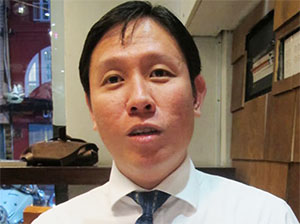US tightening anticipated minor impact on inward remittances
 |
| Financial expert Huynh Trung Minh |
What’s your assessment of inward remittance flows to Vietnam in the latter months of this year?
Official data is still not available at the moment. According to the State Bank of Vietnam’s Ho Chi Minh City branch, the city received about $3 billion in these funds in the first eight months of the year, a 5 per cent jump on-year.
This indicates that the volume of inward remittances continues on its growth momentum, albeit at a slower rate than previously. Therefore, I believe the US President’s announcement will not be a large influence on money flows into Vietnam or will only have a psychological effect. More important is how the economy impacts the income of overseas Vietnamese living in other countries which will directly affect their money transfer to their relatives in Vietnam.
Have inward remittance flows been slowing down? How about the real estate field, where it previously was particularly strong?
In fact, remittances keep flowing into Vietnam for investment targets. However, beside this kind of money, growing outbound investment has also been recorded. In addition, investors may engage in internal transactions, making it difficult to provide accurate statistics.
Inward remittance flows, particularly from the US, are predicted to decline in the upcoming time. In your view, why is this so?
The is still responsible for the lion’s share of inward money flows to Ho Chi Minh City, with about 60 per cent, while the EU accounts for 19 per cent. Besides, natural calamities have been wreaking havoc throughout the US in recent months, so it may prove hard for overseas Vietnamese living at these locations to send home money.
Exchange rates are relatively stable and there is a zero per cent deposit rate on the USD. How do receivers usually use remittances, do they convert it into Vietnam dong or keep it in foreign currencies?
They mostly convert it into dong as the exchange rate has been kept stable in the past year and the deposit rate on USD is held at zero per cent, making it more beneficial to keep dong at this point of time.
In fact, so far during the year, the exchange rate inched up more than 1 per cent, while short-term dong-denominated deposits fetch 6-7 per cent per year. Compared to the zero per cent on dollar deposits, keeping dong is more beneficial.
What the stars mean:
★ Poor ★ ★ Promising ★★★ Good ★★★★ Very good ★★★★★ Exceptional
Latest News
More News
- From easy money to selective bets: investment prospects for Vietnam in 2026 (January 06, 2026 | 16:51)
- Stock market starts 2026 with growth and governance in focus (January 06, 2026 | 08:45)
- Cake by VPBank posts strong gains in scale and efficiency leveraging AI focus (January 05, 2026 | 18:55)
- Banks step up listing plans in 2026 to strengthen capital and transparency (December 31, 2025 | 18:59)
- Ho Chi Minh City projects $10.5 billion remittance inflows in 2025 (December 31, 2025 | 18:58)
- New decree sharpens enforcement in securities market (December 31, 2025 | 18:53)
- Gold market reform advances as SBV receives applications for bullion production (December 30, 2025 | 12:07)
- EVN and AFD sign credit agreement for Vietnam’s first pumped storage hydropower plant (December 30, 2025 | 10:06)
- Techcombank Priority Visa Signature unlocks a higher standard of living (December 29, 2025 | 16:44)
- Tax sector wraps up 2025 and sets priorities for next year (December 25, 2025 | 14:00)
















 Mobile Version
Mobile Version